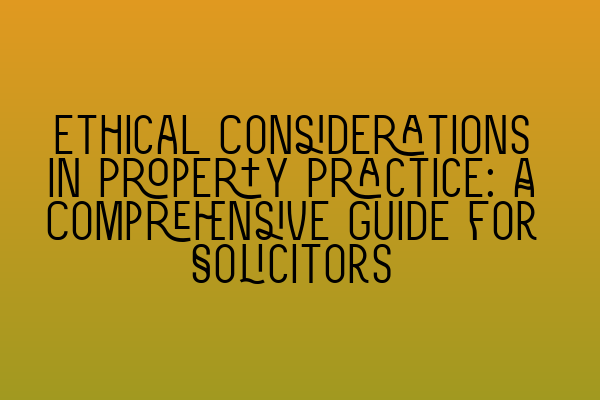Ethical Considerations in Property Practice: A Comprehensive Guide for Solicitors
As a solicitor practicing property law, it is crucial to uphold high ethical standards in your professional practice. Ethical considerations play a significant role in ensuring a fair and just legal system, promoting trust with clients, and maintaining the integrity of the legal profession.
1. Confidentiality and Client Privacy
One of the fundamental ethical principles in property practice is maintaining client confidentiality. Solicitors must ensure that all client information remains confidential and is not disclosed to any unauthorized parties. This includes safeguarding sensitive information such as financial documents, personal details, and legal strategies.
By upholding client confidentiality, solicitors can build trust with their clients and foster an environment where clients feel comfortable sharing all necessary information. This trust is crucial for effective representation and providing clients with the best legal advice possible.
2. Conflict of Interest
Another key ethical consideration in property practice is avoiding conflicts of interest. Solicitors must take steps to identify and address any potential conflicts that may arise between clients or between their own interests and those of their clients.
It is essential to conduct thorough conflict checks before taking on a new client or matter. This includes identifying any relationships, financial interests, or legal obligations that may create a conflict. If a conflict is found, solicitors should take the necessary steps to either obtain informed consent from all affected parties or decline representation to avoid compromising their ethical obligations.
3. Honesty and Integrity
Honesty and integrity are at the core of ethical property practice. Solicitors must provide accurate and truthful information to their clients, courts, and other parties involved in the transaction. Misrepresentation or withholding of material facts can not only damage a solicitor’s reputation but also have legal consequences.
Additionally, solicitors should not engage in any fraudulent or deceptive practices. This includes avoiding conflicts of interest, not engaging in bribery or corruption, and adhering to all relevant laws, regulations, and professional codes of conduct.
4. Professional Competence and Diligence
Being a competent and diligent solicitor is not only an ethical responsibility but also crucial for providing effective legal representation. Solicitors must continually update their knowledge and skills to ensure they are competent in property law matters.
Professional competence involves understanding the complexities of property law, staying up to date with relevant case law, legislation, and industry trends. Solicitors should also be diligent in managing their caseload and ensuring that they have sufficient time and resources to provide quality representation to each client.
5. The Duty to the Court
Solicitors have a duty to the court to act with honesty, integrity, and in the best interests of justice. This includes not misleading the court or engaging in any activities that may undermine the administration of justice.
It is crucial for solicitors to present evidence truthfully, respect court procedures and orders, and refrain from any conduct that may compromise the impartiality or fairness of the judicial process.
Conclusion
Ethical considerations are an integral part of property practice for solicitors. By adhering to high ethical standards of confidentiality, avoiding conflicts of interest, practicing honesty and integrity, maintaining professional competence, and fulfilling the duty to the court, solicitors can provide ethical and effective legal representation to their clients.
For further resources on preparing for the SQE exams and enhancing your legal knowledge, we recommend checking out the following links:
- SQE 1 Practice Exam Questions
- SQE 1 Practice Mocks FLK1 FLK2
- SQE 2 Preparation Courses
- SQE 1 Preparation Courses
- SRA SQE Exam Dates
